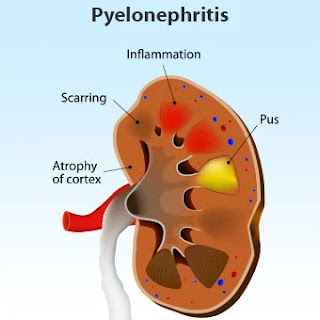Pyelonephritis- Causes, Symptoms, Treatment
Pyelonephritis is a severe kidney infection in which the kidneys are swelled and may permanently damage them as well. As the attacks come on a regular basis it is known as chronic pyelonephritis. It usually occurs in children and people with urinary obstructions.
Symptoms and Causes
The symptoms appear within two days of infection which has high fever, pain in the abdomen, back, side or groin, painful or burning urination, cloudy urine, pus or blood int he urine, frequent urination, fishy smelling urine, chills, nausea, vomiting, general aching, fatigue, moist skin and mental confusion. Though the symptoms may differ according to the age gap.
The infections start in the lower urinary tract in the form of urinary tract infection (UTI). Bacteria like E.Coli causes infection which enters through the urethra, tends to multiply and keeps spreading to the bladder. From here it then travels to the ureters and he kidneys. In case if the infection is too severe then it can also cause chronic pain.
Risk Factors
If the normal flow of the urine is interrupted then the risk factors are too high. As the size of the urethras are shorter than men, they tend to enter the body more easily. Women are at higher risk than men for kidney infections. Also if anyone is suffering from kidney stones, daibetes, HIV, AIDS, cancer, enlarged prostate or people with vesicouretal reflux are at risk. Certain other factors which shall be taken into account are catheter use, cystoscopic examination, urinary tract surgery, certain medications and nerve or spinal cord damages can also put one at risk for this disease.
Diagnosis and Treatment
The doctor shall look for fever, tenderness in the abdomen, kidney infections though a urine test. It helps them to detect the bacteria, concentration, blood and pus in the urine as well. An ultrasound shall also be done for checking the cysts, tumor. An immediate test should be done within 72 hours failing which the doctor shall immediately order for a CT scan. A dimercaptosuccinic acid (DMSA) test may be done if the doctor suspects scarring. In this test, a professional injects the material through a vein in the arm which then travels to the kidneys. Further the images that are taken as the radioactive material is seen passing through the kidneys hence showing the scarred areas.
The treatment procedure begins with the antibiotics. These medicines follow a dose of 2-3 days but it should be taken for 14 days. The medicines are Levofloxacin, Ciprofloxacin, Co-trimoxazole, Ampicillin. These medicines can be ordered online from the best online medical app in India. However, if the drug therapy is ineffective then the doctor shall ask to be admitted to the hospital. In case of severe infection, a surgery named Nephrectomy shall be done where parts of the kidney are removed.
Outlook
Pyelonephritis is a serious condition which requires immediate treatment for speedy recovery. Thus it is important to take preventive measures like drinking plenty of fluids, wipe from front to back after sex and also urinate to flush out the bacteria and avoid using products that irritate urethra.




Comments
Post a Comment